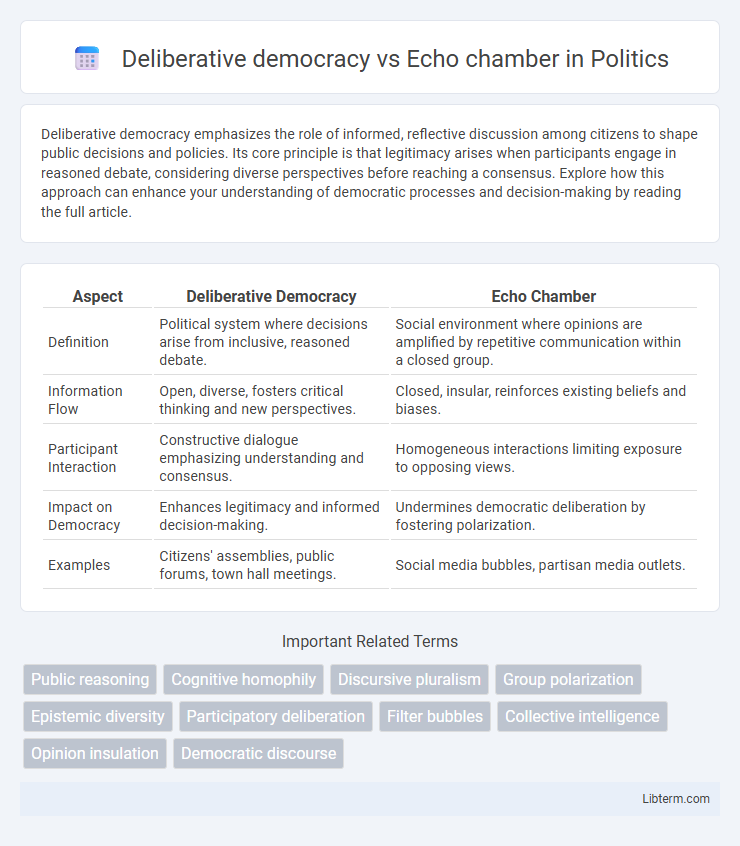Deliberative democracy emphasizes the role of informed, reflective discussion among citizens to shape public decisions and policies. Its core principle is that legitimacy arises when participants engage in reasoned debate, considering diverse perspectives before reaching a consensus. Explore how this approach can enhance your understanding of democratic processes and decision-making by reading the full article.
Table of Comparison
| Aspect | Deliberative Democracy | Echo Chamber |
|---|---|---|
| Definition | Political system where decisions arise from inclusive, reasoned debate. | Social environment where opinions are amplified by repetitive communication within a closed group. |
| Information Flow | Open, diverse, fosters critical thinking and new perspectives. | Closed, insular, reinforces existing beliefs and biases. |
| Participant Interaction | Constructive dialogue emphasizing understanding and consensus. | Homogeneous interactions limiting exposure to opposing views. |
| Impact on Democracy | Enhances legitimacy and informed decision-making. | Undermines democratic deliberation by fostering polarization. |
| Examples | Citizens' assemblies, public forums, town hall meetings. | Social media bubbles, partisan media outlets. |
Introduction to Deliberative Democracy and Echo Chambers
Deliberative democracy emphasizes inclusive, reasoned discussion where diverse viewpoints are exchanged to reach informed consensus, enhancing the quality of collective decision-making. Echo chambers, in contrast, isolate individuals within insulated environments that reinforce existing beliefs and limit exposure to opposing perspectives. Understanding the dynamics between these concepts highlights the challenges in fostering genuine public deliberation amid the widespread proliferation of socially and algorithmically curated information bubbles.
Core Principles of Deliberative Democracy
Deliberative democracy centers on inclusive, reasoned discussion where diverse viewpoints are critically examined to reach well-informed decisions, emphasizing transparency, equality, and respect for differing opinions. It actively counters echo chambers by fostering open dialogue and exposing participants to contrasting perspectives, preventing ideological isolation. Core principles include participatory engagement, rational deliberation, and the collective pursuit of legitimacy through consensus-building.
Defining the Echo Chamber Phenomenon
The echo chamber phenomenon occurs when individuals are exposed predominantly to information and opinions that reinforce their existing beliefs, creating a feedback loop that limits exposure to diverse perspectives. In contrast to deliberative democracy, which emphasizes open, reasoned dialogue among diverse participants to reach mutual understanding, echo chambers hinder critical thinking and deliberation by isolating users within ideologically homogeneous groups. This phenomenon can exacerbate polarization and reduce the quality of democratic decision-making by undermining the inclusive and reflective discourse essential for deliberative processes.
Historical Development and Evolution
Deliberative democracy traces its roots to ancient Athens, evolving through Enlightenment thinkers like Rousseau and Habermas, emphasizing reasoned discussion and inclusive decision-making. Echo chambers, by contrast, emerged prominently with the rise of digital and social media in the 21st century, where algorithm-driven content creates isolated information bubbles reinforcing existing beliefs. The historical evolution reflects a shift from open, collective reasoning in public forums to fragmented, personalized media consumption shaping political polarization.
Mechanisms of Public Discourse
Deliberative democracy fosters public discourse through structured dialogue and reasoned debate, encouraging diverse viewpoints and critical thinking to reach consensus. Echo chambers isolate individuals within homogenous opinion groups, reinforcing preexisting beliefs and limiting exposure to opposing perspectives. These contrasting mechanisms shape the quality and inclusiveness of democratic decision-making processes.
Impacts on Political Polarization
Deliberative democracy fosters informed dialogue and mutual understanding by encouraging diverse viewpoints, which can reduce political polarization and promote consensus-building. Echo chambers amplify homogeneous opinions and filter out opposing perspectives, intensifying political polarization and deepening societal divisions. This contrast highlights how inclusive communication in deliberative democracy counters the fragmenting effects of echo chambers on political discourse.
Role of Technology and Social Media
Technology and social media significantly influence deliberative democracy and echo chambers by shaping information flow and public discourse. Algorithms on platforms like Facebook and Twitter often create echo chambers by prioritizing content that reinforces users' existing beliefs, hindering diverse perspectives essential for deliberative democracy. Conversely, digital tools such as online forums and decision-making platforms can facilitate inclusive dialogue, enabling broader participation and informed debate across diverse communities.
Benefits and Challenges of Deliberative Approaches
Deliberative democracy promotes inclusive dialogue where diverse participants critically assess different perspectives, enhancing decision quality and fostering mutual understanding. It encourages informed public engagement, which can lead to more legitimate and accepted policies by emphasizing reasoned debate over partisan rhetoric. Challenges include potential dominance by vocal minorities, logistical complexities in organizing large-scale deliberations, and risks of dialogue being undermined by entrenched biases or misinformation.
Counteracting Echo Chambers in Modern Societies
Deliberative democracy promotes informed and inclusive public discourse by encouraging diverse perspectives and critical reasoning, which counteracts the polarization typical of echo chambers. Structured forums and digital platforms designed for deliberation foster exposure to differing viewpoints, reducing confirmation bias and groupthink. Modern societies benefit from integrating these democratic practices to enhance social cohesion and improve decision-making processes.
Future Prospects for Democratic Engagement
Deliberative democracy fosters future prospects for democratic engagement by encouraging inclusive dialogue and critical thinking, which can mitigate the polarization effects inherent in echo chambers. As technology advances, platforms designed for deliberative processes may enhance citizens' ability to evaluate diverse viewpoints, thereby strengthening democratic participation. The challenge lies in developing scalable tools that promote reasoned public discourse and resist algorithm-driven content segregation characteristic of echo chambers.
Deliberative democracy Infographic

 libterm.com
libterm.com